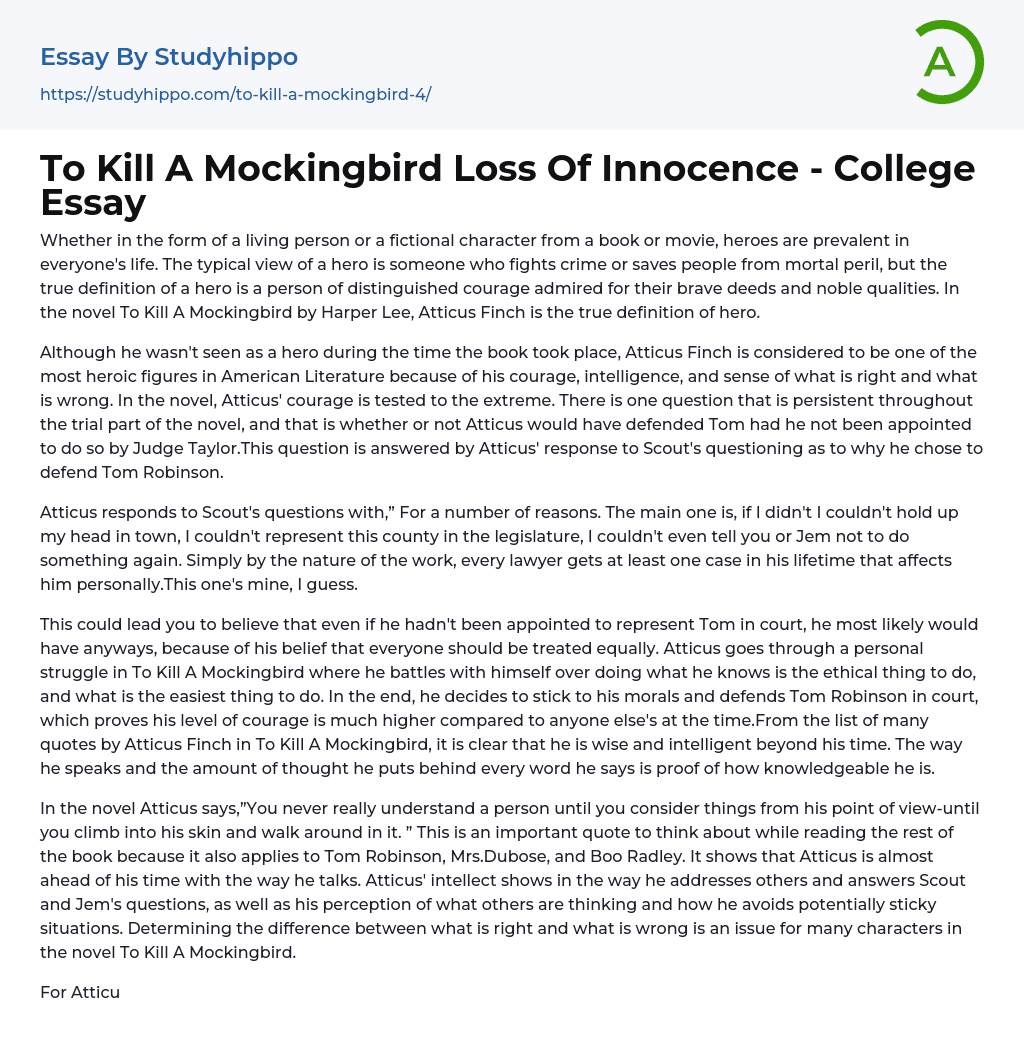Heroes can take various forms, whether they are real-life individuals or characters from works of fiction in literature or movies. Though commonly linked to fighting against crime and saving people from harm, a true hero is someone who displays extraordinary bravery and receives admiration for their virtuous traits. In To Kill A Mockingbird by Harper Lee, the character Atticus Finch is portrayed as the embodiment of a hero.
Despite not being perceived as heroic during the book's timeframe, Atticus Finch is regarded as a prominent figure of heroism in American Literature. This is attributed to his intellect, bravery and unwavering moral compass. Atticus' fortitude is challenged throughout the novel, particularly during the trial section where it remains uncertain whether he would have defended Tom Robinson if not mandated by Judge Taylor. Scout inquires why Atticus chose to
...represent Tom, and his response dispels any ambiguity surrounding this inquiry.
Atticus explains to Scout that he has several reasons for taking on the case, including maintaining his self-respect in the community, representing the county in legislative matters, and advising Scout and Jem. As a lawyer, it is inevitable to encounter cases that affect them personally, and this happens to be one of those cases for Atticus.
Atticus's belief in equal treatment for all is evident, as he would have taken on Tom's case even if not appointed to represent him in court. Though faced with an internal struggle between doing what is ethical versus what is easy throughout To Kill A Mockingbird, Atticus chooses to defend Tom Robinson, showcasing exceptional courage during a time when such attitudes were scarce. His astute and thoughtful rhetoric, demonstrated by the many quotes attribute
to him in the novel, exemplifies intelligence and wisdom surpassing those of his era.
Atticus' quote "You never really understand a person until you consider things from his point of view-until you climb into his skin and walk around in it" is significant throughout To Kill A Mockingbird. This philosophy relates to Atticus' understanding of Tom Robinson, Mrs. Dubose, and Boo Radley. Atticus exhibits advanced thinking patterns in his communication with others, including how he responds to Scout and Jem's inquiries. He possesses an ability to perceive what others are thinking, allowing him to avoid challenging situations. The novel highlights the complexity of deciphering right from wrong for its characters.
Atticus constantly faces the challenge of making the right choices. He initially faces difficulty in defending Tom Robinson, knowing that it could lead to trouble not only for himself but also for his children. However, he is confident in his decision to have Jem read to Mrs. Dubose as he knows it will benefit Jem in the long term. The toughest moral dilemma for Atticus arises when he suspects Jem of stabbing Bob Ewell and chooses to allow him to be prosecuted instead of defending him, illustrating his unwavering commitment to doing what is right regardless of his personal connections.
The quote "There is no right way to do wrong" is a perfect fit for To Kill A Mockingbird, as it emphasizes that one cannot choose the easier path of doing wrong and expect no consequences. Atticus, initially unnoticed by his children and respected in Maycomb, eventually proves to be an amazing and heroic figure. As the story unfolds, the viewpoints of the children and citizens undergo a
gradual shift, where the townspeople lose their respect for Atticus, and his children develop an immense admiration for him.
Atticus remains resolute in his determination to find goodness in every individual he encounters, regardless of their opinions about him - a quality that epitomizes heroism.
- Values of Life essays
- Ethical dilemma essays
- Normative Ethics essays
- Virtue Ethics essays
- Belief essays
- Deontology essays
- Moral essays
- Virtue essays
- Work Ethic essays
- 1984 essays
- A Farewell to Arms essays
- A Good Man Is Hard to Find essays
- A Hanging essays
- A Lesson Before Dying essays
- A Long Way Gone essays
- A Rose For Emily essays
- A Separate Peace essays
- A Tale Of Two Cities essays
- A Very Old Man With Enormous Wings essays
- Adventures Of Huckleberry Finn essays
- Alice in Wonderland essays
- All Quiet on The Western Front essays
- Allegory of the Cave essays
- An occurrence at owl creek bridge essays
- Animal Farm essays
- Anthem essays
- Antigone essays
- Arthur Conan Doyle essays
- As I Lay Dying essays
- Atticus Finch essays
- Barn Burning essays
- Battle Royal essays
- Beauty and The Beast essays
- Beloved essays
- Boo Radley essays
- Brave New World essays
- Candide essays
- Castle essays
- Characters In Hamlet essays
- Characters In Romeo And Juliet essays
- Christmas carol essays
- Chronicle of a Death Foretold essays
- Cinderella essays
- Crime and Punishment essays
- Daisy Miller essays
- Death of a Salesman American Dream essays
- Desdemona essays
- Diary Of A Wimpy Kid essays
- Dracula essays
- Dubliners essays




